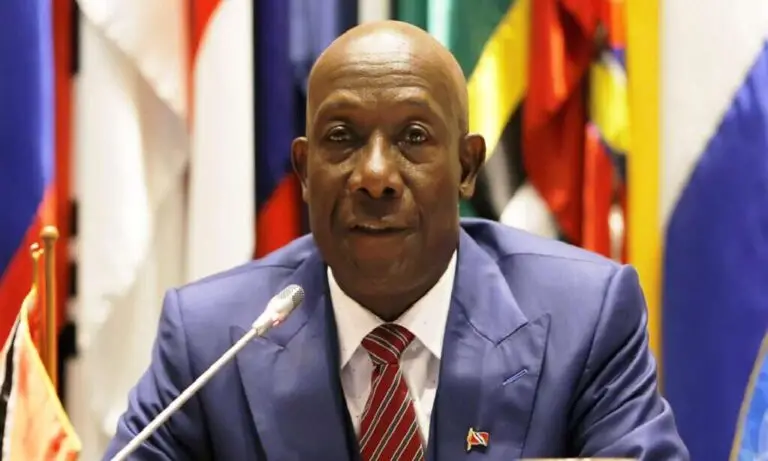In a powerful display of frustration and determination, workers from various unions in Trinidad and Tobago braved torrential rains to protest outside the Prime Minister’s residence, demanding an end to what they describe as government greed and mismanagement. The protest, led by the Oilfield Workers Trade Union (OWTU), highlighted deep-seated anger over a proposed salary increase for government officials while public sector workers face wage stagnation.
The demonstration took place outside the Diplomatic Centre in St. Ann’s, with protesters calling for Prime Minister Dr. Keith Rowley to resign and declare a general election. Chants of “enough is enough” echoed through the air as members of the Communication Workers Union, the Aviation Communication and Allied Workers Union, and employees of the Trinidad and Tobago Electricity Commission (T&TEC) joined forces to voice their dissent.
A Widening Rift Between Government and Workers
Union leaders argue that the government’s acceptance of the Salaries Review Commission (SRC) report, which grants significant salary increases to Cabinet members, is a glaring act of self-interest. “While workers struggle to make ends meet, they comfortably accept a 47.2% salary increase for themselves,” OWTU president general Ancel Roget stated during the protest.
Roget emphasized that T&TEC workers have not seen a salary adjustment since 2014, despite mounting economic pressures and inflation. “The standard of living for the people in this country has been declining rapidly over the past nine years,” he said, accusing the government of neglecting its citizens.
The Movement for Social Justice (MSJ) also weighed in, with political leader David Abdulah criticizing the rationale behind the salary increases. “This decision shows an arrogant disregard for the hardships faced by ordinary citizens,” Abdulah said, urging workers and citizens to mobilize and pressure the government to reverse its decision.
Protests Intensify as Patience Runs Thin
The unions’ anger was further inflamed by the lack of progress in wage negotiations and the government’s perceived indifference to workers’ plight. The protests originally targeted Public Utilities Minister Marvin Gonzales but later shifted focus to Prime Minister Rowley, even though he was out of the country.
Union leaders have vowed to escalate their actions, warning of more widespread protests if their demands are ignored. Roget declared, “This is just the beginning. We will not sit idly by while the government continues to fail its people.”
Public Sentiment and the Path Ahead
As public dissatisfaction grows, questions about governance, accountability, and fairness dominate national discourse. Abdulah raised a critical point during the protests: “If Trinidad and Tobago conducted a performance appraisal of its politicians, would they deserve a raise? The answer is no.”
With crime rates soaring, infrastructure crumbling, and the economy struggling, the government faces mounting criticism from unions and citizens alike. The SRC report’s implementation, seen as tone-deaf in the face of national hardships, has become a lightning rod for dissent.
The protests reflect more than frustration over salaries—they are a call for a government that prioritizes its people over self-enrichment. Whether the government will heed the growing discontent remains to be seen, but for now, the streets of Trinidad and Tobago are alive with the voices of those demanding change.

